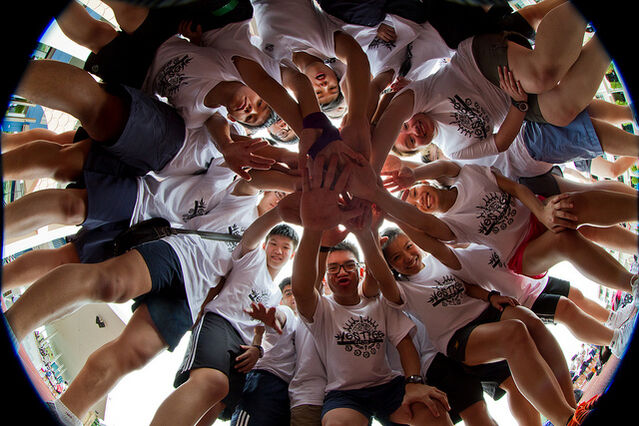Teamwork
4 Common Complaints About Teamwork
Responding to the how of teamwork.
Posted December 18, 2021 Reviewed by Vanessa Lancaster
Key points
- When students have to work together on a group project, resentment can build regarding effort, authority, autonomy, and credit.
- Common complaints about teamwork include: “Why do I have to work with him?!” and “She’s not doing her part!”
- Both process and outcome are important in group work.

Learning to work with others is not easy. Cooperation, collaboration, negotiation, compromise, and teamwork are all lovely ideals, but the nitty-gritty of working together on a project is not always pretty.
Common Complaints About Teamwork
When students have to work together on a group project, resentment can build as they navigate effort, authority, autonomy, and credit issues. But this difficulty is precisely why group projects can be so useful for kids. The skills they develop in working on group projects can serve them well in adult life.
Here are four complaints children (and adults) commonly voice during group projects and some possible ways parents or teachers can respond:
“I’d rather do it on my own!” Kids who voice this objection don’t understand that working in groups provides important learning opportunities. Nearly every adult job requires collaboration, so always going it alone isn’t an option.
A possible response to this is: "You’re right! It’s often simpler to do things on our own, but sometimes the situation requires working with others. This is a chance for you to practice that. You may find that more ideas and hands help you get stuff done better and faster."
“Why do I have to work with him?!” This objection is unkind—especially if expressed loudly and publicly—but there’s probably an element of truth behind it. Some people are easier to work with than others, and we enjoy some people’s company more than others. That’s human nature. But in adult work environments, we often don’t choose our work partners and we may be required to work with someone very different from us.
Some empathy training could be important here. You may want to speak to the child privately and say, “I’m sure you didn’t mean to embarrass Zach, but that comment was hurtful. You wouldn’t like it if someone said that about you. I expect you to be respectful and kind to everyone.”
“They won’t listen to me!” This objection could reflect a childish view of teamwork involving the belief that “Everyone should do what I want!” This student may need to learn to compromise and be open to others’ input. Learning to express opinions or suggestions in clearer, more assertive, or less demanding ways could also be important.
Alternatively, this objection could involve a coalition within the group where one student is excluded. This situation could require teacher intervention, emphasizing that group performance depends on everyone contributing.
“She’s not doing her part!” Some students use group projects as an opportunity to sit back and let others do the work. This can be very frustrating to other team members, but again, it’s not an uncommon situation in adult work life, so it’s worth learning how to manage it.
Possibilities include encouraging group members to ask the nonworking student what’s getting in the way of their participation, offering the nonworking student a choice of roles, or having this student work with another group member rather than having an individual contribution to the project.
Focusing on Process
Before starting projects, having students discuss possible challenges that can come up in group work can help them be more prepared to handle these. Teachers can emphasize that both process and outcome are important.
One measure of process effectiveness is group morale. Most students understand that contributing ideas and effort are important for group work. Still, they may not realize that how they interact with group members significantly impacts how teammates feel about working together.
Below is a checklist of possible ways to contribute to group morale. You may want to have your child look over this list for a bit of self-assessment. How well does your child implement these essential—but sometimes subtle—teamwork skills?
For teachers, it may help students generate their list of ways to contribute to a team (perhaps using this list as a jumping-off point) before starting a group project. Students can then assess themselves after the project on how they did with teamwork skills.
How Well Do You Do with These Teamwork Skills?
____ Ask other children’s opinions. “What do you want to do?” “What do you think?”
____ Listen carefully to other children’s comments without arguing.
____ Agree with other children’s suggestions. “Good idea!”
____ Thank other children for their effort. “Thanks! You did a lot of work on that!”
____ Work cheerfully without complaining.
____ Offer to share the most fun parts of the project. “Let’s do that together.”
____ Express enthusiasm for the project. “This is fun!”
____ Offer to compromise. “How about if we do it partly your way and partly my way?”
____ Give in graciously if others disagree. “OK, if that’s what you all want, that’s what we’ll do.”
____ Ignore others’ small mistakes or minor imperfections.
____ Ask permission before correcting other children’s work.
____ Compliment other children’s work. “That looks great!”
(Checklist excerpted with permission from Kennedy-Moore & Lowenthal, 2011).
The What vs. the How of Schoolwork
There are two main categories of things kids learn in school: The what and the how. The what has to do with specific content: What are the phases of the moon? What are the causes of the Civil War? What are the steps to solve a quadratic equation? Honestly, kids will forget most of this. But that’s okay because The what is a vehicle for learning the how.
The how has to do with the process. Your child will use this information throughout life: How do I get my work done efficiently? How do I figure out what the teacher/boss wants? How do I work well with others?
Learning the how of teamwork can be challenging, but it's essential. It can also be fun.
References
Kennedy-Moore, E. & Lowenthal, M. S. (2011). Smart Parenting for Smart Kids: Nurturing Your Child’s True Potential. San Francisco, CA: Jossey-Bass/Wiley.




